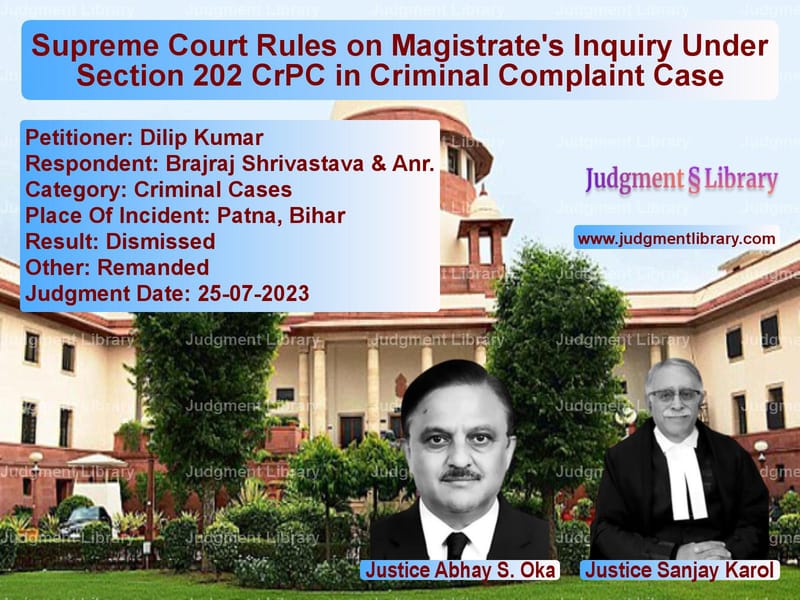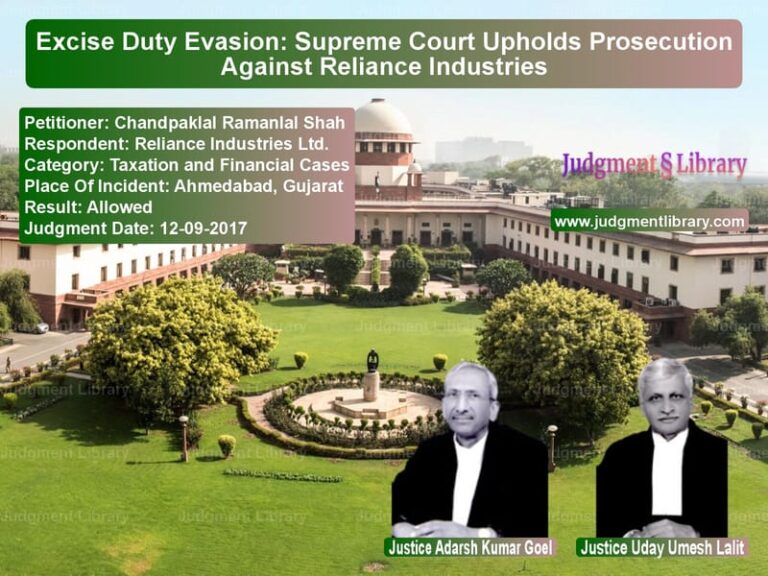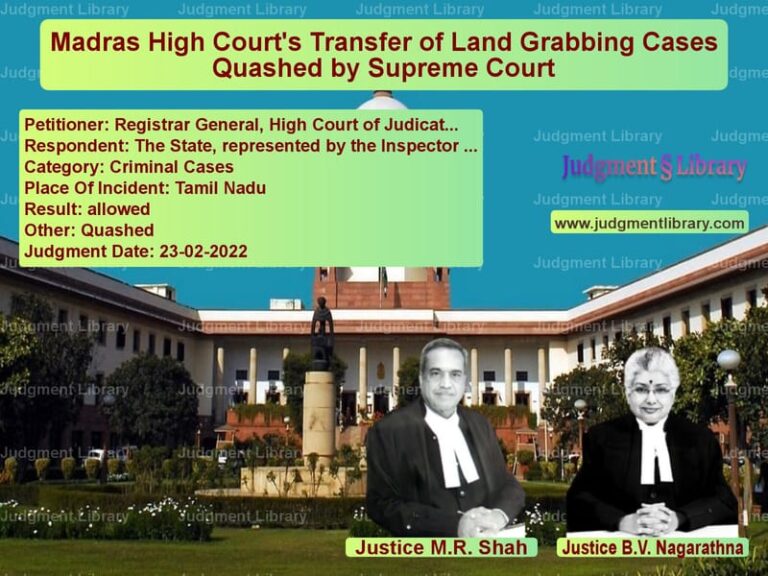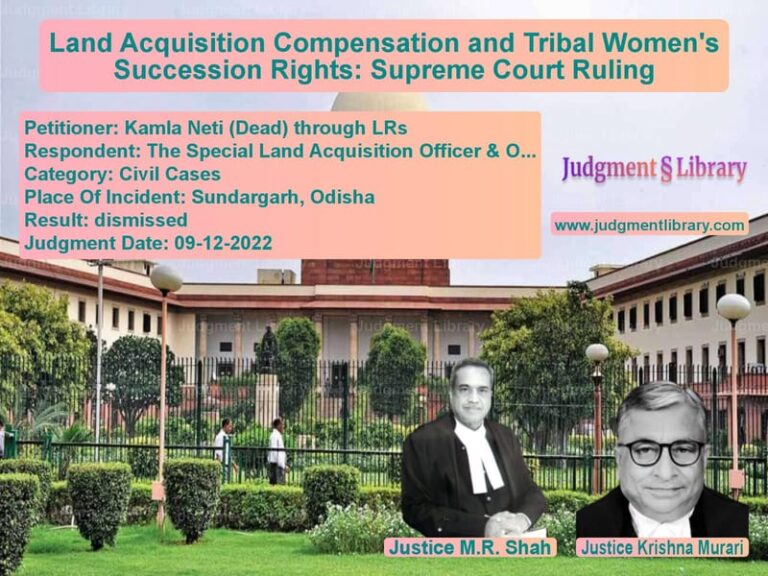Supreme Court Rules on Magistrate’s Inquiry Under Section 202 CrPC in Criminal Complaint Case
The Supreme Court in Dilip Kumar vs. Brajraj Shrivastava & Anr. ruled on the validity of a Magistrate’s inquiry under Section 202 of the Code of Criminal Procedure (CrPC). The Court upheld the Patna High Court’s decision to remand the case back to the Magistrate, emphasizing the importance of examining all cited witnesses before dismissing a complaint.
Background of the Case
A criminal complaint was filed under Section 200 CrPC by the respondent, naming Dilip Kumar as the accused. The complaint alleged multiple offenses under the Indian Penal Code (IPC), including:
- Section 323 – Voluntarily causing hurt
- Section 342 – Wrongful confinement
- Section 500 – Defamation
- Section 504 – Intentional insult to provoke breach of peace
- Section 506 – Criminal intimidation
- Section 295A – Deliberate acts to outrage religious feelings
- Section 298 – Uttering words with intent to hurt religious feelings
- Section 427 – Mischief causing damage
On August 22, 2008, the Magistrate ordered an inquiry under Section 202(1) CrPC, opting to conduct the inquiry personally instead of directing police investigation. However, the Magistrate only recorded the statement of the complainant and, without examining other witnesses, dismissed the complaint on September 18, 2008 under Section 203 CrPC.
The complainant challenged this dismissal before the Patna High Court, which ruled that the inquiry was incomplete and remanded the case back to the Magistrate.
Legal Issues Before the Supreme Court
- Was the Magistrate required to record the statements of all cited witnesses before dismissing the complaint?
- Did the High Court err in remanding the case for a fresh inquiry?
- Was the Magistrate’s conclusion that the complaint was mala fide justified?
Arguments by the Appellant (Dilip Kumar)
The appellant’s counsel argued:
- The Magistrate had discretion under Section 202(1) CrPC to record only the complainant’s statement.
- The Magistrate correctly concluded that the complaint was malicious and lacked substance.
- The High Court wrongly interfered with the Magistrate’s discretion.
- Reliance was placed on the Supreme Court’s decisions in Mohinder Singh vs. Gunwant Singh and Nagawwa vs. Veeranna Shivalingappa Konjalgi.
Arguments by the Respondent
The complainant countered:
- The complaint named eight witnesses, none of whom were examined.
- The Magistrate’s order did not provide reasons for not recording other witness statements.
- The dismissal under Section 203 CrPC was premature.
- The High Court rightly ordered a fresh inquiry as per established judicial precedents.
Supreme Court’s Observations and Judgment
The Supreme Court, comprising Justices Abhay S. Oka and Sanjay Karol, ruled in favor of the complainant.
1. Magistrate Must Consider Statements of All Cited Witnesses
“Before dismissing a complaint under Section 203 CrPC, a Magistrate must examine not only the complainant but also other material witnesses, unless there are compelling reasons not to do so.”
2. No Reasons Were Given for Ignoring Witness Testimonies
“The Magistrate’s order does not explain why none of the eight witnesses cited in the complaint were examined. This omission renders the inquiry incomplete.”
3. High Court’s Order for Fresh Inquiry Was Justified
“Given the failure to record witness statements, the High Court correctly remanded the case for a proper inquiry under Section 202(1) CrPC.”
4. Observations on Section 197 CrPC Are Tentative
“Since the case is being remanded, the High Court’s observations regarding the requirement of sanction under Section 197 CrPC are only tentative and should not prejudice the fresh inquiry.”
Final Judgment
- The Supreme Court upheld the Patna High Court’s ruling, remanding the case to the Magistrate for a fresh inquiry.
- The Magistrate was directed to examine the complainant’s witnesses before deciding whether to proceed.
- Observations on Section 197 CrPC were set aside to avoid prejudicing the inquiry.
Implications of the Judgment
- Reaffirms that a Magistrate must record statements of all material witnesses before dismissing a complaint.
- Ensures that complaints are not arbitrarily dismissed without due examination of evidence.
- Clarifies that preliminary inquiries under Section 202 CrPC must be conducted fairly and thoroughly.
- Provides guidance on the treatment of cases requiring sanction under Section 197 CrPC.
This ruling strengthens procedural fairness in criminal complaints and prevents arbitrary dismissals at the preliminary stage.
Petitioner Name: Dilip Kumar.Respondent Name: Brajraj Shrivastava & Anr..Judgment By: Justice Abhay S. Oka, Justice Sanjay Karol.Place Of Incident: Patna, Bihar.Judgment Date: 25-07-2023.
Don’t miss out on the full details! Download the complete judgment in PDF format below and gain valuable insights instantly!
Download Judgment: dilip-kumar-vs-brajraj-shrivastava-supreme-court-of-india-judgment-dated-25-07-2023.pdf
Directly Download Judgment: Directly download this Judgment
See all petitions in Legal Malpractice
See all petitions in Bail and Anticipatory Bail
See all petitions in Criminal Defamation
See all petitions in Judgment by Abhay S. Oka
See all petitions in Judgment by Sanjay Karol
See all petitions in dismissed
See all petitions in Remanded
See all petitions in supreme court of India judgments July 2023
See all petitions in 2023 judgments
See all posts in Criminal Cases Category
See all allowed petitions in Criminal Cases Category
See all Dismissed petitions in Criminal Cases Category
See all partially allowed petitions in Criminal Cases Category







